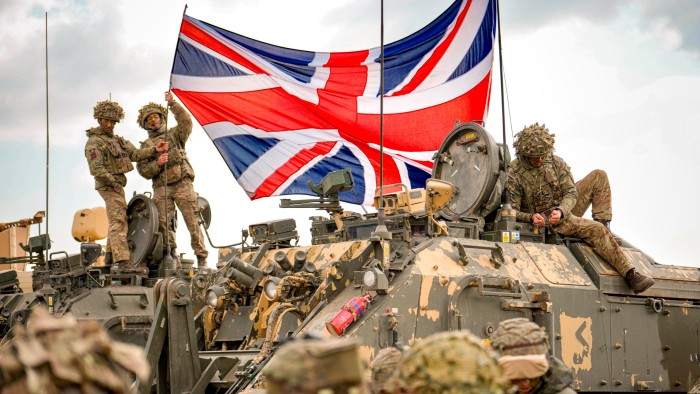Unlock the White House Watch newsletter for free
Your guide to what Trump’s second term means for Washington, business and the world
Sir Keir Starmer will pledge to Nato that the UK will raise spending on national security to 5 per cent of GDP within a decade, as members attempt to convince US President Donald Trump to stick with the alliance.
The pledge would raise core defence spending to 3.5 per cent of GDP by 2035, with an additional 1.5 per cent on security related infrastructure such as cyber security and border protection.
The UK prime minister had already pledged to raise defence spending from around 2.3 per cent currently to 2.6 per cent by 2027, with an ambition to increase it to 3 per cent in the next parliament.
But the new pledge of 3.5 per cent on core defence spending means billions more pounds will eventually flow into the army, navy and air force as the UK attempts to reinforce itself against Russian aggression and prove to the US it is pulling its weight.
Nato secretary-general Mark Rutte has pushed for the 5 per cent figure — including the 1.5 per cent on adjacent security spending — partly to boost the headline number for Trump’s eyes, given the US president’s focus on Europe’s lower levels of defence spending in recent decades.
While almost all Nato members have agreed to the spending level, Spain opted out on Sunday, in a blow to the cohesiveness of the group as it tries to present a united front to Trump.
The UK’s funding will make possible many of the plans outlined in this month’s strategic defence review, which recommended a greater use of drones, autonomous vehicles and artificial intelligence alongside new nuclear warheads, submarines and fighter jets.
Carl Emmerson at the Institute for Fiscal Studies said the increase, in today’s terms, would be like adding approximately £30bn to the 2027 target of around spending £75bn on core defence.
The pledge will raise questions, however, over how the increase will be funded, and whether other public services will face cuts, at a time when the UK is facing a financial squeeze.
Chancellor Rachel Reeves is expected to have to raise taxes in the autumn to give her financial headroom, and the government is already facing resistance to plans to cut the UK’s welfare budget.
Starmer said the UK must “navigate this era of radical uncertainty with agility, speed and a clear-eyed sense of the national interest” to provide security for “working people”.
“This is an opportunity to deepen our commitment to Nato and drive greater investment in the nation’s wider security and resilience,” Starmer added.
The 1.5 per cent of non-core spending has been billed by the government as “homeland security” and “resilience” investment and is expected to cover things such as civil preparedness, cyber threats, border and energy security and other areas with defence-adjacent purposes, with the details to be agreed at the Nato summit.
It was not immediately clear, however, whether this will attract any additional spending.
Once adjacent spending was included, the government said UK security spending would be 4.1 per cent of GDP by 2027 — the same year that core defence spending is expected to reach 2.6 per cent.
That implies the adjacent spending is already close to 1.5 per cent of GDP, if it is to reach that level within two years.
Downing Street said more details of the spending plans would be laid out at the Nato summit on Wednesday and Thursday, which Trump is expected to attend.

The UK played up its need to become less reliant on allies, as the Trump administration threatens to reduce support for Europe.
“In a more transactional world, the report determines that building our own sovereign, independent capabilities in strategically important areas will reduce our dependency on other nations,” the government said.
Ministers hope the additional spending will also help boost the UK economy, calling the national security strategy “a call to action that our entire society needs to become more resilient”.
It added: “Recognising that national security means more than it used to — from the security of our borders to the health of our economy, from supply chains to food prices and from safety on our streets to the online world.”
“Faced by this reality in a world of increasing ‘grey zone’ threats, we cannot take a piecemeal approach that enhances the security of one part of our critical national infrastructure but leaves gaps elsewhere for our adversaries to exploit.”
Additional reporting by Sam Fleming




